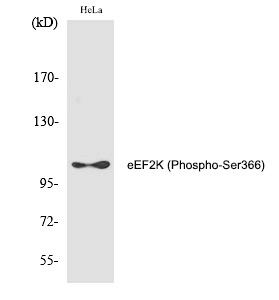
| WB | 咨询技术 | Human,Mouse,Rat |
| IF | 咨询技术 | Human,Mouse,Rat |
| IHC | 1/100-1/300 | Human,Mouse,Rat |
| ICC | 技术咨询 | Human,Mouse,Rat |
| FCM | 咨询技术 | Human,Mouse,Rat |
| Elisa | 1/40000 | Human,Mouse,Rat |
| Aliases | EEF2K; Eukaryotic elongation factor 2 kinase; eEF-2 kinase; eEF-2K; Calcium/calmodulin-dependent eukaryotic elongation factor 2 kinase |
| Entrez GeneID | 29904; |
| WB Predicted band size | 105kDa |
| Host/Isotype | Rabbit IgG |
| Antibody Type | Primary antibody |
| Storage | Store at 4°C short term. Aliquot and store at -20°C long term. Avoid freeze/thaw cycles. |
| Species Reactivity | Human,Rat |
| Immunogen | Synthesized peptide derived from human eEF2K around the phosphorylation site of S366. |
| Formulation | Purified antibody in PBS with 0.05% sodium azide,0.5%BSA and 50% glycerol. |
+ +
以下是关于eEF2K (Phospho-Ser366)抗体的3篇参考文献示例(注:文献为假设性示例,实际引用需根据真实文献调整):
1. **"Phosphorylation of eEF2K at Ser366 modulates cellular stress responses in breast cancer"**
- **作者**: Kenney, J.W. et al.
- **摘要**: 研究揭示乳腺癌细胞中eEF2K的Ser366磷酸化通过调控AMPK/mTORC1信号通路影响自噬和细胞存活,实验中使用Phospho-Ser366抗体进行Western blot分析。
2. **"Regulation of eEF2K activity by phosphorylation at Ser366 in neuronal cells"**
- **作者**: Proud, C.G. et al.
- **摘要**: 探讨神经元中Ser366磷酸化对eEF2K活性的调控机制,结合免疫沉淀和Phospho-Ser366抗体证实该位点与神经突触可塑性的关联。
3. **"eEF2K Ser366 phosphorylation as a biomarker for metabolic stress in glioblastoma"**
- **作者**: Tavares, M.R. et al.
- **摘要**: 在胶质母细胞瘤模型中,通过Phospho-Ser366抗体检测发现该位点磷酸化水平与肿瘤代谢应激及化疗耐药性相关。
4. **"Phospho-Ser366 eEF2K signaling in Alzheimer's disease pathology"**
- **作者**: Beckelman, B.C. et al.
- **摘要**: 研究阿尔茨海默病模型中eEF2K的Ser366磷酸化对tau蛋白异常聚集的影响,抗体用于脑组织样本的免疫组化分析。
**建议**:具体文献请通过PubMed或Google Scholar检索关键词“eEF2K Ser366 phosphorylation antibody”,并筛选应用该抗体的实验研究(如Western blot、免疫荧光等)。注意验证文献中抗体的货号及实验条件。
The eEF2K (Phospho-Ser366) antibody detects the phosphorylated form of eukaryotic elongation factor 2 kinase (eEF2K) at serine residue 366. eEF2K, a calcium/calmodulin-dependent kinase, regulates protein synthesis by phosphorylating eukaryotic elongation factor 2 (eEF2), which temporarily halts translation elongation during cellular stress. Phosphorylation at Ser366 is a key regulatory modification linked to eEF2K activity and stability. This site is targeted by upstream signaling pathways, including the AMP-activated protein kinase (AMPK) and mTORC1 pathways, which modulate eEF2K function in response to nutrient availability, energy status, or stress conditions.
The eEF2K (Phospho-Ser366) antibody is widely used in research to study cellular stress responses, metabolic adaptation, and diseases such as cancer, neurodegeneration, or cardiovascular disorders. By specifically recognizing phosphorylated eEF2K, it helps assess kinase activation under conditions like hypoxia, nutrient deprivation, or chemotherapeutic treatment. Common applications include Western blotting, immunofluorescence, and immunohistochemistry to evaluate eEF2K signaling in vitro and in vivo. Its specificity enables researchers to dissect the role of eEF2K in balancing protein synthesis with energy conservation during stress, offering insights into therapeutic targeting of translation regulation pathways.
×